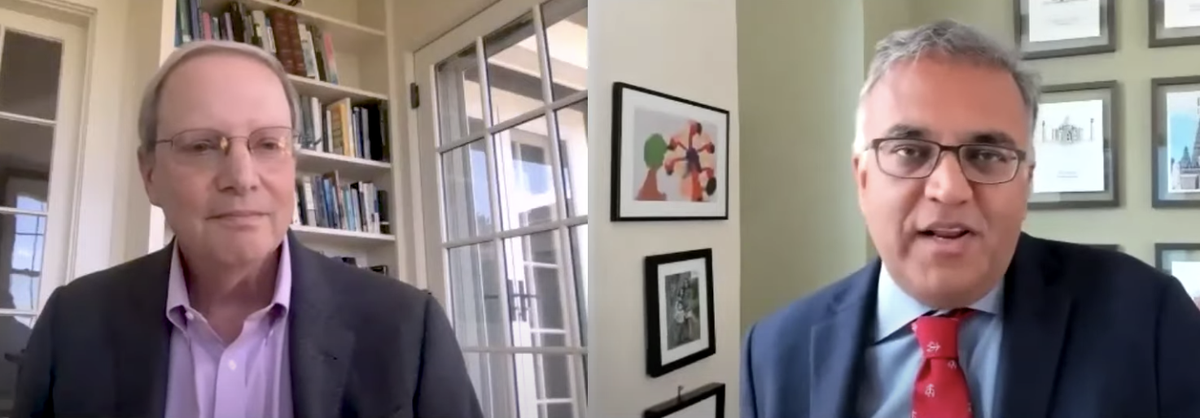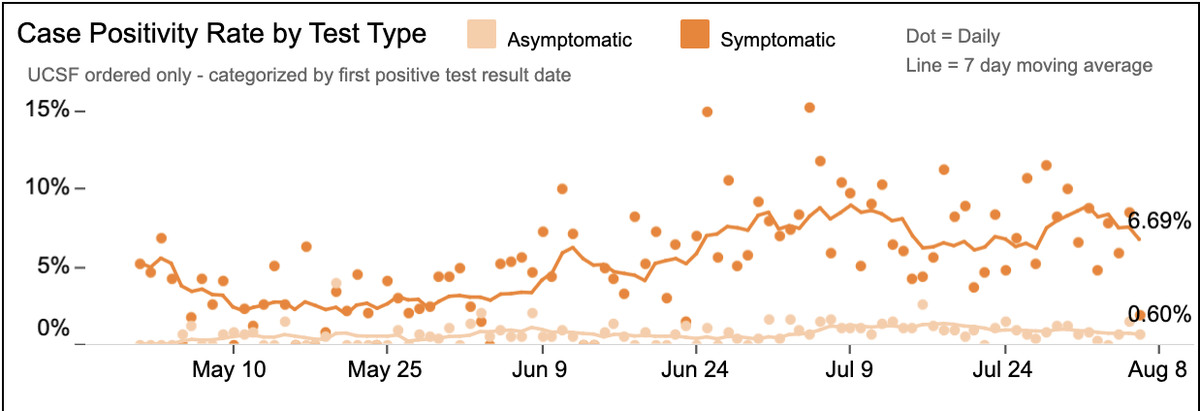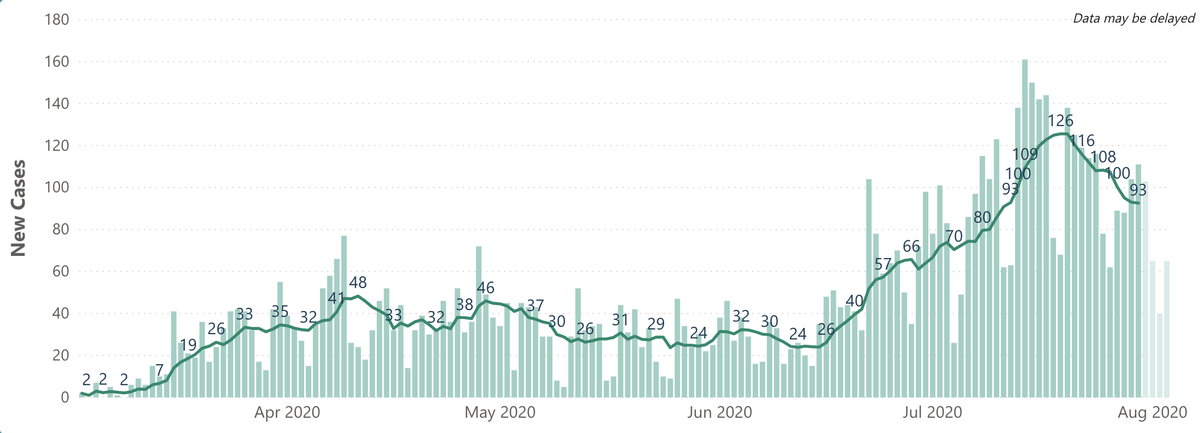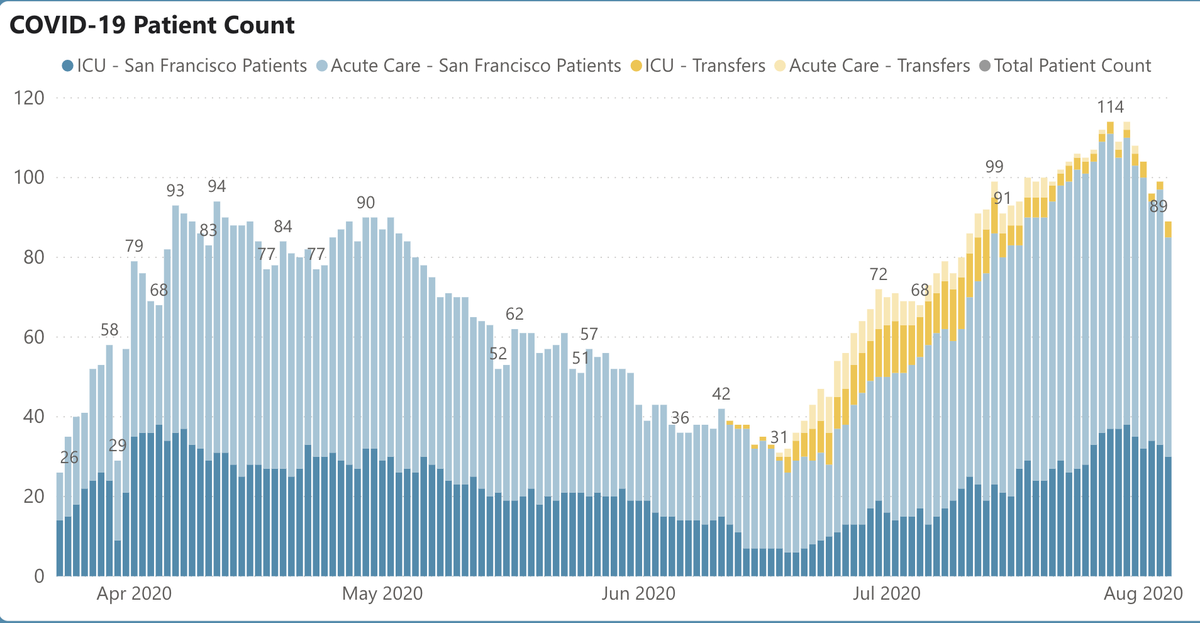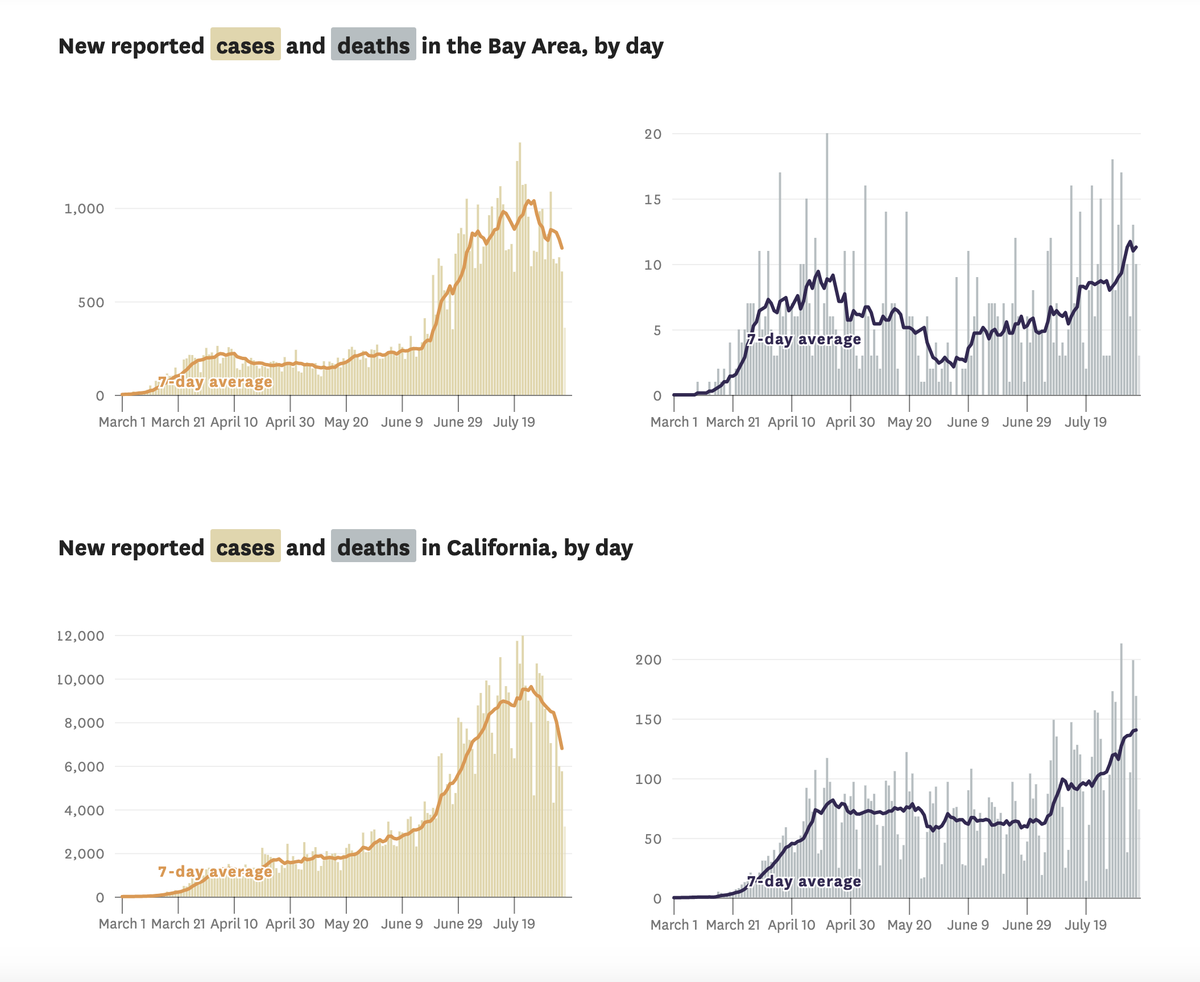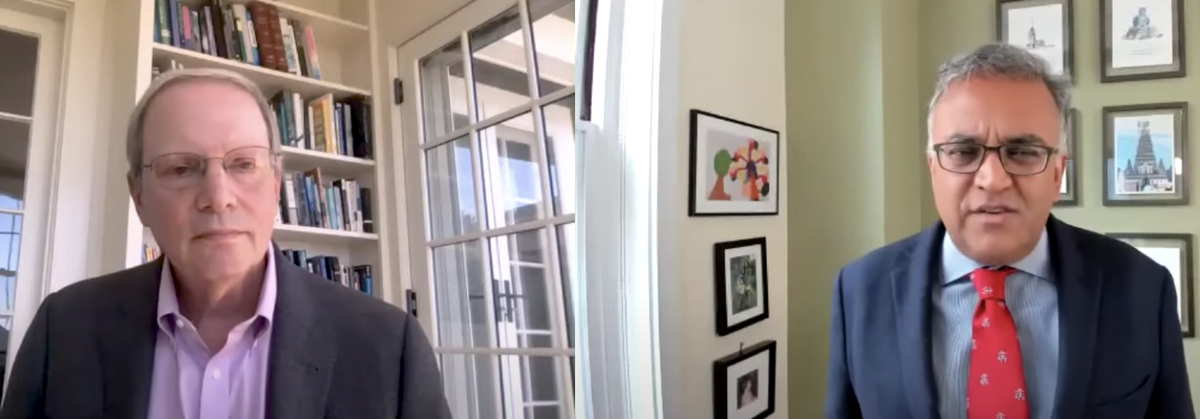1/ Covid ( @UCSF) Chronicles, Day 142
Medical Grand Rounds today, available here https://tinyurl.com/y5qo5kp7 . Today, a far-ranging discussion with @ashishkjha, one of the smartest, most thoughtful people I know in healthcare, and a great communicator on all-things-Covid.
Medical Grand Rounds today, available here https://tinyurl.com/y5qo5kp7 . Today, a far-ranging discussion with @ashishkjha, one of the smartest, most thoughtful people I know in healthcare, and a great communicator on all-things-Covid.
2/ I hope you'll find the time (70 minutes) to watch it – I’ll provide a few highlights below but I do this mostly to whet your appetite. Just a chat, no slides, so it would be fine to listen to it as a podcast.
I’ll start today w/ a few local updates, mostly pretty good news.
I’ll start today w/ a few local updates, mostly pretty good news.
3/ @ucsfhospitals, 34 pts, 7 on vents. Steady fall in hospitalizations last 4d (Fig on L). Might be blip but seems real.
Case positivity rate also good (Fig R); down to 6.7% for pts w/ symptoms (~9% last mth) & 0.6% for asymptomatic (1.1% last mth). My conclusion: less virus.
Case positivity rate also good (Fig R); down to 6.7% for pts w/ symptoms (~9% last mth) & 0.6% for asymptomatic (1.1% last mth). My conclusion: less virus.
4/ SF cases down (Fig on L); avg 93/d; vs 126 last mth (note holes in recent data). Test + rate 3.86% (down from 4.5%); also ? reliability. Hospitalizations (a more reliable #)=89, way down from 114 last wk (Fig R). As I anticipated https://tinyurl.com/yyrcwdha , things improving in SF
5/ Finally, Bay Area & CA cases falling (though data problems also at play); deaths still heading up. As we’ve discussed, this is probably a reverse lag; cases fall but deaths keep going up since they result from cases (and often hospital admissions) from several weeks ago.
6/ Now grand rounds, I’ll briefly sum up a few of Ashish’s points. @ 3:00, I asked him to reflect on his experience as a @UCSF resident/chief resident. He recalled many AIDS pts in hospital as an intern in 1997. In 2001 when he finished: none. “Showed how fast things can change.”
7/ Ashish has done hundreds of interviews on all the major networks (in March/April, he was doing 25 a day!). @ 5:30, I asked what he tries to achieve: “My goal: not to spread misinformation." He tries to avoid being too political, but to be constructive & stick with the facts.
8/ @ 10:30: Ashish: “Let me share all the things I got wrong.” In this Jan. @Health_Affairs piece https://tinyurl.com/y6jb26gk , he argued that U.S. would respond superbly to Covid. It took him a month to appreciate that we'd squandered our advantages. Exhibit A: failures at @CDCgov.
9/ @ 43:00: Ashish diagnoses CDC’s failure: "the politicization of a great public health agency... There are still great people there…(but) they have been told that their advice has to go through the White House… It's a level of politicization that I didn’t anticipate.”
10/ @ 14:00, Ashish describes lessons from other countries. “Not monolithic.” Some have been great with testing, others did the lockdown well. But the unifying theme is that "all of them took the pandemic seriously" at a federal level. The U.S. did not.
11/ @ 21:15: I asked about Sweden; he laughed. ”In all these conversations, every country is code for a point (someone is) trying to make. But "it’s complicated...no easy answers.” Sweden did poorly at first, now much better – he can see both plusses & minuses of their approach.
12/ @ 24:20: Lessons from masks: At first, we didn’t know for sure that they worked, “but we should have had more humility & less certainty.” We sought to preserve healthcare worker supply, but people came to believe they didn’t work. Now, we have compelling evidence they do.
13/ @ 32:30, I asked him why he's been such a proponent of testing. “It was Public Health 101. The entire strategy of how you deal with infections that can be spread to others is to identify who is infected and separate them from others… it’s always been the cornerstone…”
14/ “The fact that we couldn’t generate a simple…PCR test… struck me as both incredibly problematic and confusing… it didn’t make sense to me that we couldn’t do this…Over time I have come to realize there was a lot more going on.”
What was it? A) White House foot-dragging.
What was it? A) White House foot-dragging.
15/ @ 39:00: We’re doing fewer tests than 2 wks ago, we’ve overwhelmed the system. Agreeing w/ Chaz Langelier from last wk’s grand rounds https://tinyurl.com/yxay5ybk , Ashish wants more, faster, cheaper testing – even if they’re a bit less sensitive, the tradeoffs would be worth it.
16/ @ 45:00, Ashish on schools. “If you’re in the middle of [a surge], it’s very hard to bring kids back.” Advice: Job one is to bring the virus under control in a community. Then, be creative, open windows, have classes outside. And we should be testing kids, teachers and staff.
17/ But once Trump opined, schools became politicized. Ashish: “You only get 1 shot at this. If you open schools & have to close them,” it’ll set you way back. He tweeted that NYC should open schools given current low virus levels; instantly got huge pushback–“You’re a Trumper.”
18/ @ 52:30: On vaccines: "Speaking of things that aren't helpful, (Trump) saying that we’ll have a vaccine by election day is not helpful.” Jha believes that we’ll have multiple effective vaccines available by early 2021. But distribution is complex – won’t be a "one-and-done."
19/ @ 58:00: I asked about my theory https://tinyurl.com/y5fufywe that–if we could lower death/mortality to flu-like levels–we could return to "normal." He sort of agreed, but thinks that trauma of 250K deaths will mean that it's "too fresh in people’s minds” to return to normal life.
20/ @ 1:01:00: On disparities, confluence of Covid disparities & George Floyd murder means “I think this time is different…I see it as part of a broader racial justice agenda…The (Covid) disparities are mind-boggling… I’m optimistic that we won’t just put out nice statements.”
21/ @ 1:04:45: I asked re: the transformation of healthcare system. “What the crisis did is make us ask: how do we deliver healthcare services differently… (We’re moving to) a much more creative & flexible healthcare system… I think it’ll look meaningfully different in 5 yrs.”
22/ @ 1:07:00: I asked Ashish to reflect on Covid’s lessons for a young physician or med student. ”In moments of crisis, you have to have principles you stick with…” For Ashish, they're science and evidence-based medicine. Also, authenticity is key, must tell people the truth.
23/ Ashish: One thing we learned from the 1918 "Great Flu" is that these things change society in very dramatic ways. "Only in retrospect can you draw the dots back to the event." To trainees: "think about how you want to use this moment to shape the society you want to live in.”
24/ That’s it, a wonderful and thoughtful dive into some of the most interesting and complex issues in the pandemic. Once again, it’s here: https://tinyurl.com/y5qo5kp7 – hope you can watch or listen.
Back tomorrow with weekly round-up. Stay safe.
Back tomorrow with weekly round-up. Stay safe.

 Read on Twitter
Read on Twitter